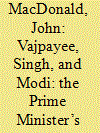| Srl | Item |
| 1 |
ID:
095250


|
|
|
|
|
| Publication |
2009.
|
| Summary/Abstract |
This report takes stock of the state of the field of international studies in India and recommends a vision and measures to strengthen the field and make it equal to those in leading institutions and programmes around the world. The ultimate goals of the measures recommended in the report are to:
a. make India a leading centre of knowledge and education in international studies;
b. produce a substantive pool of Indian scholars doing cutting-edge work that contributes to the production and accumulation of knowledge;
c. produce first-rate graduates to meet the demands and opportunities arising from the modernization and rise of India in a changing world; and
d. ensure that Indian IS scholarship contributes to increasing the knowledge base on India's international role as a responsible power fostering peace, security, good governance, economic development and resolution of a wide range of problems in its immediate region and the world.
The vision, measures and strategies here would reform and build on existing institutions as well as create new ones by drawing on the best practices in leading institutions in India and other countries
|
|
|
|
|
|
|
|
|
|
|
|
|
|
|
|
| 2 |
ID:
174824


|
|
|
|
|
| Summary/Abstract |
Indian Prime Ministers occupy the pinnacle of India’s government, national security hierarchy, and nuclear command and control infrastructure, which allows them to make decisions that transform Indian nuclear strategy. However, within India’s nuclear decision-making bureaucracy, other actors including India’s nuclear scientists and engineers, the military, and democratic processes can also adjust Indian nuclear strategy which creates rivalry. This article argues that the Indian Prime Minister’s position gives them the ability to influence and direct these various domestic political actors to make a nuclear strategy that suits the Prime Minister’s interests. But as bureaucratic actors actually translate the Prime Minister’s directions into policy, it results in influence often falling short of control in setting nuclear strategy. Applying a bureaucratic model to the making of nuclear strategy, the article’s findings suggest that Prime Ministers have purposefully guided and overseen India’s post-Pokhran-II nuclear strategy beyond a “minimal” credible deterrent outlined in its 1999 official nuclear doctrine.
|
|
|
|
|
|
|
|
|
|
|
|
|
|
|
|